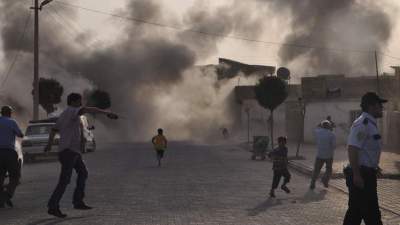
Mortar fire from Assad troops lands in Alcakale, Turkey, killing 5
See also Today's Syria, Turkey (and Beyond) Live Coverage: Erdogan's Red Line
Wednesday's Syria (and Beyond) Live Coverage: A Double Bombing in Aleppo "Kills Dozens"
UPDATE:
Turkish parliament has granted President Erdogan to send troops and planes into Syrian territory if the government deems it necessary for security. Our assessment has been added to the end of the article.Syrian forces, moving to retake a border crossing in Tal Abyad, north of Al Raqqah, fired mortar rounds on Wednesday into the heart of Alcakale, Turkey, landing in the center of the town. Five people were killed, including at least one child.
The outrage was immediate. By the end of the day, Turkey had invoked Article 4 of the NATO alliance, and NATO had released a statement condemning the Syrian regime's actions. Perhaps more importantly, Turkey scheduled an emergency meeting of Parliament where it is possible that, later this morning, President Erdogan will be granted permission to engage Turkish armed forces in the defence of the border.
Is Turkey bluffing?
This is not just a question of the immediate Turkish response across the border. The artillery fire, while limited, extended 100 miles into from where the initial incident took place. Turkish Press reports that Turkish artillery fire hit military targets in Idlib city, where Syrian forces are locked in battle with insurgents. This fire may have effectively helped the Free Syrian Army, who have surrounded Idlib city, still nominally held by the regime but under increasing pressure. Furthermore, some sources suggest that Assad military artillery bases were hit in several areas, and still others suggest that Ain Issa, south of the Tal Abyad border crossing where the catalyst incident took place, was also hit by artillery strikes. Turkey is sending a clear message to the Assad regime - continue to break the peace and we will hit you where it hurts.
And, of course, this is not just an issue of a Turkish response but of that by the international community. It is highly doubtful that Ankara's symbolic response to NATO will lead to military intervention by a coalition; however, lesser but still very significant steps may now be undertaken --- substantial military as well as the existing "non-lethal aid" for the Free Syrian Army, including provision of the missiles and weapons to take on Syrian aircraft, and provision of intelligence.
And could yesterday's events be the catalyst for the long-discussed but always-deferred "protected zone" for Syrians? Certainly Turkey has used the refugee issue to keep that issue on the table, and the killing of its civilians only adds a possible further incentive.
This will play out in the forthcoming days and turns in part on whether the Assad regime makes conciliatory noises to assure that there will be no repeat of Wednesday's casualties. Meanwhile, it is fair to say that Turkish civilians as well as Syrians are now cross in the cross-hairs, or at least the cross-fire, of this conflict.
Update:
Erdogan has been granted permission, by his parliament, to move troops into Syria and use force if necessary to protect Turkey. This is not war, but it means that if at any time the Turkish government feels threatened, they won't need anyone's permission to attack inside Syrian territory.However, beyond the obvious, there is another consequence. This now means that the Turkish government could begin to carry out covert missions, or even training missions, inside Syria if President Erdogan and Foreign Minister Davutoglu believe it is now in Turkey's best interests to increase support for Syria's insurgency. Though it remains to be seen whether this is an option that will be used, the wide margin of the vote gives Erdogan a clear mandate that he can now do whatever he thinks is necessary to increase Turkey's security. Remember that Erdogan has already identified the surge in refugees as a security threat, and Erdogan has already reached the "red line" number of 100,000 refugees. Does this mean he will take advantage of this mandate and try to care for refugees on the Syrian side of the border? And, if so, will this spark further escalation of tensions, or even fighting, between Ankara and Turkey?